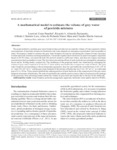Please use this identifier to cite or link to this item:
http://www.alice.cnptia.embrapa.br/alice/handle/doc/1000149| Title: | A mathematical model to estimate the volume of grey water of pesticide mixtures. |
| Authors: | PARAIBA, L. C.  PAZIANOTTO, R. A. A.   LUIZ, A. J. B.   MAIA, A. de H. N.   JONSSON, C. M.   |
| Affiliation: | LOURIVAL COSTA PARAIBA, CNPMA; RICARDO ANTONIO ALMEIDA PAZIANOTTO, CNPMA; ALFREDO JOSE BARRETO LUIZ, CNPMA; ALINE DE HOLANDA NUNES MAIA, CNPMA; CLAUDIO MARTIN JONSSON, CNPMA. |
| Date Issued: | 2014 |
| Citation: | Spanish Journal of Agricultural Research, Madrid, v. 12, n. 2, p. 509-518, 2014. |
| Description: | The usual method to calculate grey water footprint does not take into account the volume of water required to dilute concentrations of pesticide mixtures in freshwater and it also depends on maximum concentration limit acceptable in water. We propose a model to estimate the grey water footprint of crops by calculating the volume of water necessary to dilute pesticide mixtures reaching freshwaters. The model requires short-term toxicity data from aquatic organisms based on EC50 values, soil pesticide half-life and soil sorption coefficient values, and does not require maximum concentration limit acceptable in water. The lixiviation rate and runoff rate of each pesticide was estimated by attenuation factor and by Soilfug model, respectively. The usefulness of the proposed model was illustrated by estimating the volume of grey water required to dilute the 17 most widely used herbicides in sugarcane crops of Brazil. The grey water footprint corresponding to the recommended agronomic dose for each herbicide varied between 4.20×106 m3 yr-1 and 1.20×1012 m3 yr-1 and the grey water footprint of the mixture of herbicides was 2.36×1012 m3 yr-1 in a cultivated area of 8.4×106 ha. These results establish the ranking position of each herbicide in the composition of the grey water footprint of mixture of herbicides. The rank of each herbicide could be used to create a label to be placed on the package of the pesticide, thus informing farmers about the volume of grey water per hectare due to the use of this herbicide. |
| Thesagro: | Agrotóxico Herbicida Qualidade da água Modelo matemático |
| NAL Thesaurus: | Herbicides Environmental impact Water quality Water footprint Sugarcane Mathematical models |
| Keywords: | Pesticide management Water quality objective Cana-de-açúcar |
| Type of Material: | Artigo de periódico |
| Access: | openAccess |
| Appears in Collections: | Artigo em periódico indexado (CNPMA)  |
Files in This Item:
| File | Description | Size | Format | |
|---|---|---|---|---|
| 2014AP013.pdf | 90,65 kB | Adobe PDF |  View/Open |









